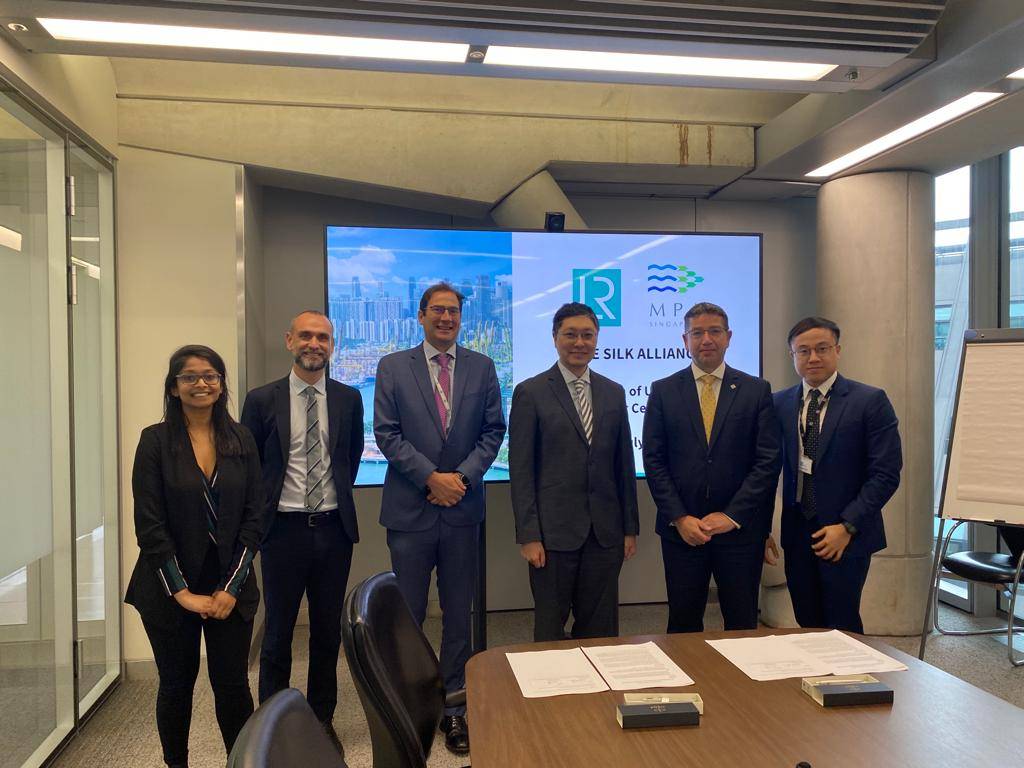The Maritime and Port Authority of Singapore (MPA) and Lloyd’s Register Maritime Decarbonisation Hub (LR MDH) have signed a Memorandum of Understanding (MoU) aimed at collaborating on a fleet-specific decarbonisation strategy and implementation plan for ‘The Silk Alliance’ cross-industry initiative to enable zero-emission shipping across the Indian and Pacific Oceans.

Through complementary technical skills and expertise, both parties will strengthen their commitment to developing partnerships in co-creating the green corridor to trial decarbonisation strategies for container ships operating primarily in Asia to achieve significant emission-saving impact. LR MDH, which is a joint initiative between Lloyd’s Register Group and Lloyd’s Register Foundation, won the International Maritime Organisation (IMO)-MPA NextGEN Connect Challenge for the “Development of a Route-based Action Plan Methodology based on The Silk Alliance”.
MPA’s entry into ‘The Silk Alliance’ initiative is a significant step forward towards deeper public-private sector collaboration between global maritime industry players and Singapore’s port regulator, focusing on actions to unlock key investments across the Indian and Pacific Oceans region as the green corridor cluster moves into an implementation phase.
The collaboration includes driving investments into scalable fuel supply infrastructure to meet the demand aggregation signal of members of The Silk Alliance and potential wider regional bunkering demands for alternative fuels.
MPA’s contribution to The Silk Alliance, which is based on the Lloyd’s Register Maritime Decarbonisation Hub’s “First Mover Framework”, complements efforts to establish the supply of low- and zero-carbon fuel options, and also its collaboration with other partners to develop Green and Digital Shipping Corridors.
Nick Brown, Chief Executive Officer, Lloyd’s Register, said: “We’re delighted to welcome the MPA to the expanding ‘The Silk Alliance’ cross-industry collaboration. Flag and port authorities play a crucial role in increasing the industry’s confidence in zero-emissions shipping, and as the world’s largest bunkering hub, we see Singapore and the MPA as a driving force in advancing the safe uptake of low-to-zero emissions fuel in the global shipping industry.”
Teo Eng Dih, Chief Executive of MPA, said: “MPA is pleased to be part of The Silk Alliance to accelerate the decarbonisation of container trade. The Silk Alliance will enable key stakeholders in Singapore to chart the transition towards low- and zero-carbon options. As the world’s largest transhipment container port and bunkering hub, Singapore will take active steps to support the decarbonisation of the container trade in line with IMO’s Revised Strategy to reduce emissions from shipping.”
Launched in May 2022 with 12 leading cross-supply chain stakeholders, The Silk Alliance brings together an integral group of organisations from both the private and public sector across the entire value chain of shipping. Inaugural members include port operator, PSA; shipowners, MSC Shipmanagement Ltd., Pacific International Lines (Pte) Ltd (PIL), Wan Hai Lines, X-Press Feeders, Yang Ming Marine Transport Corp.; shipyard, Seatrium; bunker logistical supplier, Singfar International; engine manufacturer, Wärtsilä; ship manager, Wilhelmsen Ship Management; and financial institutions, the Asian Development Bank and ING.
The Silk Alliance was initially focused on a baseline fleet that predominantly bunkers in Singapore and sails across Asia, East Africa, the Middle East, Australia, and the Pacific Islands. As the implementation phase rolls out, the baseline fleet’s demand is expected to eventually aggregate further to other regional hubs and deep-sea routes, such as the Singapore-Rotterdam green and digital shipping corridor.
Existing partners of The Silk Alliance have conducted a feasibility scenario analysis for green shipping for an in-scope fleet of container ships. Through close collaboration with the MPA and other members of The Silk Alliance, the LR Maritime Decarbonisation Hub expects that given Singapore’s status as both the top bunkering and transhipment port, supported by its innovation ecosystem, it can help accelerate The Silk Alliance’s decarbonisation efforts.